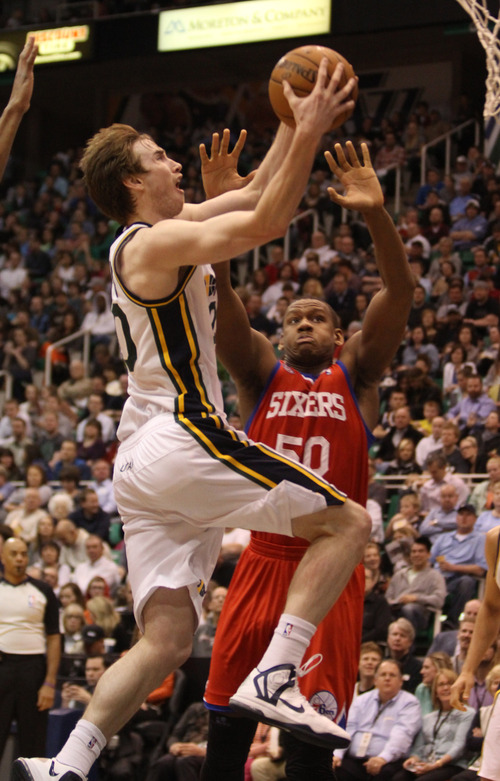This is an archived article that was published on sltrib.com in 2013, and information in the article may be outdated. It is provided only for personal research purposes and may not be reprinted.
The Jazz hustled, defended, shared the ball, made shots and generally acted interested Monday night in a performance that could only make everyone wonder: Where have these guys been lately?
Or, viewed another way, where were the Philadelphia 76ers when the Jazz needed them?
With some cooperation from the other guys, the Jazz broke a four-game losing streak and enhanced their playoff chances with a 107-91 victory at EnergySolutions Arena.
"We didn't play down to our competition … that's a good sign," said Gordon Hayward, one of eight players who scored nine or more points.
Basically, this is what it's supposed to look like in Jazzland.
Actually, this is what it did look like five weeks ago.
In mid-February, the Jazz topped Golden State 115-101 in their last game prior to the NBA trade deadline — which becomes significant in this discussion, somehow.
Pinpointing when this season went wrong is easy. Why it went wrong is much more complicated.
The only consolation is that unless the Jazz (35-36) do something extraordinary in their remaining 11 regular-season games and beyond, their multitude of free agents will have made themselves easier to dismiss, let's say that.
As of that victory over the Warriors, with Hayward blending smoothly in his return from a shoulder injury, the Jazz had won 12 of 17 games. Going into Monday's game, they had lost 12 of 15 in a downturn that's not fully explained by a tougher schedule.
During that pre-deadline surge, the Jazz defeated Miami and Oklahoma City. Since then, other than beating a tired Memphis team, their only wins have come against the downtrodden: Charlotte, Detroit and Philly. And they're winless on the road.
Last month, "We were feeling good about how we were playing, feeling confident," said Jazz coach Tyrone Corbin. "Confidence in this league is huge."
A series of tough losses, including the game in Cleveland where Mo Williams' driving layup attempt somehow bounced off the rim in his first game back from a thumb injury, obviously eroded that self-belief. The Jazz have failed to finish well against quality opponents since Williams' return.
What's more, Williams' offensive approach inevitably takes offensive opportunities from Jefferson and Millsap, which is where this gets interesting. All of them are approaching free agency. That dynamic seems to have affected this team far more negatively than the uncertainty in advance of the trade deadline.
"You want to maximize the moments," said Corbin, speaking as a former player. "So it may have worn on us a little bit. … All that stuff comes into play."
Once Hayward (the Jazz's best player lately) and Williams came back, Corbin's job became tougher, not easier. Roles, minutes and shot distribution all changed.
So the questioning of Corbin's work — and I've done my share of it — must come with the recognition that he's stuck in tough circumstances. The mysterious part to me is how Jefferson and Millsap appeared so motivated, focused and team-oriented before the trade deadline. They've missed games due to injuries since then, but that's not a complete explanation for their inconsistency and the team's struggles.
"Normally, teams play well after the trade deadline," Jefferson said. "Unfortunately for us, we just couldn't get it together. But when all's said and done, we've still got a chance."
With help from the 76ers, the Jazz looked the best they have in quite a while Monday. There's still time for them to make a run into playoff position, time for Jefferson and the others to do something that, if nothing else, would make everybody miss them when they're gone.
kkragthorpe@sltrib.comTwitter: @tribkurt



